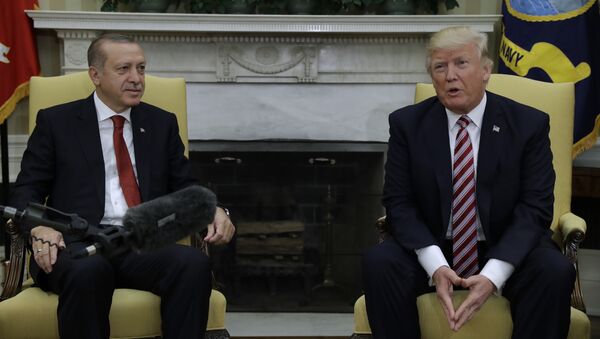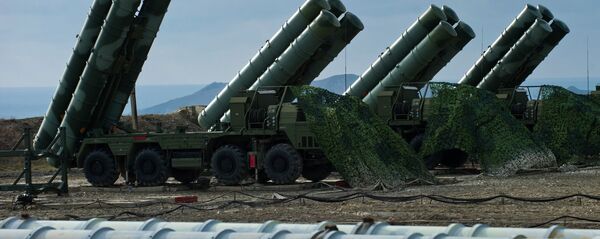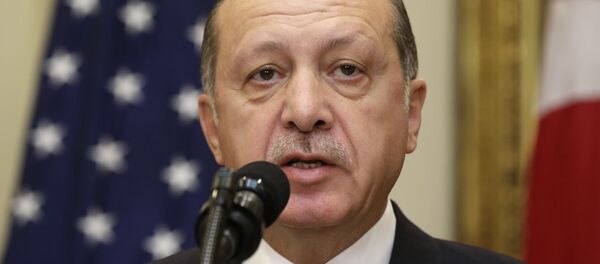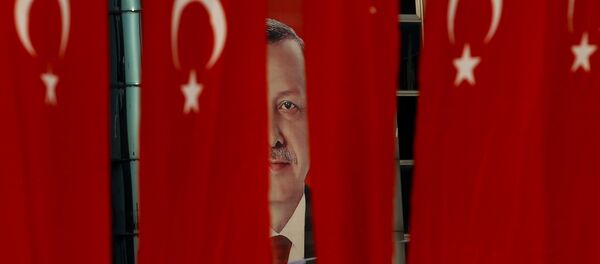Although the US-Turkish partnership has lasted for almost 70 years, sealed by the Truman Doctrine in 1947, it appears that the country's strategic alliance is irreversibly falling apart at the seams, Gevorg Mirzayan, associate professor at the department of political science at the Finance University of the Russian Government, writes for RIA Novosti.
According to the academic, Washington and Ankara's interests have recently diverged both in the Middle East war theater and the global arena.
"Clashes and conflicts between them will occur on a regular basis, while some of them may even go beyond the boundaries of aggressive mutual rhetoric," Mirzayan predicted.
However, the geopolitical divorce won't happen overnight, he added: Ankara is not ready to stand alone against Tehran or to come under heavy EU sanctions for human rights abuses. For its part, the US needs Turkey to maintain the balance of power in the Middle East. On the other hand, Washington isn't interested in shattering NATO's unity, which will be endangered in case Ankara is alienated by the West.
US-Turkish Tension Brewing for a Year
Mirzayan highlighted that the number of detained had exceeded 50 thousand, including not only Turkish citizens but also foreigners.
In October 2016 Turkish authorities arrested an American priest, Rev. Andrew Brunson, who was accused of being a member of an armed terrorist organization.
A year later Erdogan offered to exchange the clergyman for Fethullah Gulen, the founder of the Gulen movement (FETO) and the alleged mastermind behind the coup attempt in 2016.
However, the detention of Metin Topuz, a Turkish employee of the US Consulate General in Istanbul on October 4, 2017, has seemingly become the last straw: in response to Ankara's move Washington suspended all non-immigrant visa services in Turkey. The Turkish leadership immediately imposed mirrored sanctions.
While the US and Turkey are mulling over how to solve the conflict, "stock markets have already reacted," Mirzayan remarked, "The Turkish-American diplomatic scandal led to the slide of the [Turkish] lira by several percent, while Turkish Airlines' shares have lost eight points."
Three Reasons Behind US' Discontent With Turkey
Mirzayan emphasized that although the diplomatic tension could be sooner or later eased the US and Turkey have faced a number of serious contradictions, namely, the Kurdish issue, the Gulen extradition, and Ankara's Syrian policy.
Another apple of discord is Washington's unwillingness to extradite the US-based cleric Gulen: "Erdogan is sure that Fethullah Gulen — once a close ally and in some sense the guru of the Turkish leader — is controlling and orchestrating the actions of anti-Erdogan opposition in Turkey," the academic noted.
"Finally, the third reason [for the US-Turkish discord] is Ankara's actions in Syria," Mirzayan stressed, explaining that the two-year long Russian air campaign in Syria has made it clear to the Turkish leader that he wouldn't be able to topple Syrian President Bashar al-Assad.
Furthermore, Ankara has realized that if it continues to support jihadists on the ground in Syria it would lose an opportunity to influence post-war Syrian affairs, the academic remarked.
"As a result, Ankara joined the peace process in Astana and is now preparing a joint military operation with Damascus against terrorists in [the Syrian province] of Idlib," he noted.
On October 9, 2017, the Turkish General Staff announced the start of a reconnaissance operation to monitor the truce in the region.
Mirzayan highlighted that Ankara's strategy doesn't fit into Washington's plans: "The Americans continue to view Syria as a platform for weakening Russia and deterring Iran and are acting in this direction."
Given this, it is hardly surprising that the Americans regard Turkey's cooperation with Russia, Iran and Damascus as "inappropriate," the academic assumed.
Infected With Suspicion: Is West Mulling a 'Color Revolt' in Turkey?
There is yet another problem which complicates the restoration of mutual trust between the two NATO allies, according to Mirzayan: Ankara still has suspicions that the US could have been involved in the July coup attempt.
"It doesn't matter whether the US participated in organizing this coup or simply knew [about it], but did not inform Erdogan, the Turkish leader came to the conclusion, based on intelligence and elementary logic, that the US (and the West in general) wants to solve its problems with him not through negotiations, but through a regime change operation," Mirzayan surmised. "Thus, the US crossed certain red lines."
According to the academic, the future US-Turkish relationship will be "infected with the suspicion" that "the West is not giving up hope" of organizing a "color revolution" in Turkey.
"Certain signs of preparation for this revolution can be seen right now," Mirzayan wrote, citing US and EU support to Turkish human rights groups, and pro-Western Turkish dissidents.








